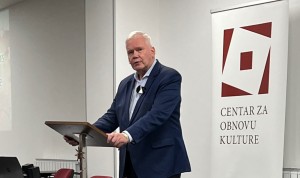 Hannes H. Gissurarson, Professor Emeritus of Politics at the University of Iceland, gave a talk on the ethics of the free market at the School of Business Administration and Economics in Zagreb, Croatia, on 24 April 2024. He said that it was relatively easy to make the case for free trade. Ef you own an apple and need an orange, while another person oens an orange and needs an apple, then you and him exchange the apple and orange to your mutual benefit. It was seemingly more difficult to make the case for private propery in apples and oranges. John Locke had argued that private property rights to resources could be developed with the proviso that others would not become worse off than the new owner. David Hume had on the other hand argued that it was a sufficient justification of private property rights that others could not present any legimitate claims to them.
Hannes H. Gissurarson, Professor Emeritus of Politics at the University of Iceland, gave a talk on the ethics of the free market at the School of Business Administration and Economics in Zagreb, Croatia, on 24 April 2024. He said that it was relatively easy to make the case for free trade. Ef you own an apple and need an orange, while another person oens an orange and needs an apple, then you and him exchange the apple and orange to your mutual benefit. It was seemingly more difficult to make the case for private propery in apples and oranges. John Locke had argued that private property rights to resources could be developed with the proviso that others would not become worse off than the new owner. David Hume had on the other hand argued that it was a sufficient justification of private property rights that others could not present any legimitate claims to them.
Whatever the origin of private property rights, the general arguments for them were twofold, according to Gissurarson. First, they tended to produce peace because good fences made good neighbours. By dividing up natural resources people reduced the likelihood of conflicts. In the second place, private property rights encouraged wealth creation because people spent more effort on what belonged to them than on what belonged to others. Farmers cultivated their own plots with more care than any plots held in common. The business of everybody became the business of nobody.
Gissurarson added that the intellectual support for the free market order had usually been based either on natural rights or on utility. But in his opinion English philosopher Michael Oakeshott had perhaps presented the most cogent argument for this order. This was, briefly, that modern Western man had gradually acquired the will and ability to make choices. He (or she) had stepped out of the tribe and become an individual. Romeo and Juliet had not found it sufficient to remain merely a Montague or a Capulet. The freedom to choose had become the second nature of modern man, and those Westerners who rejected this freedom, for example socialists, were simply refusing to recognise who they themselves were; they were mistaken about their own identity.


